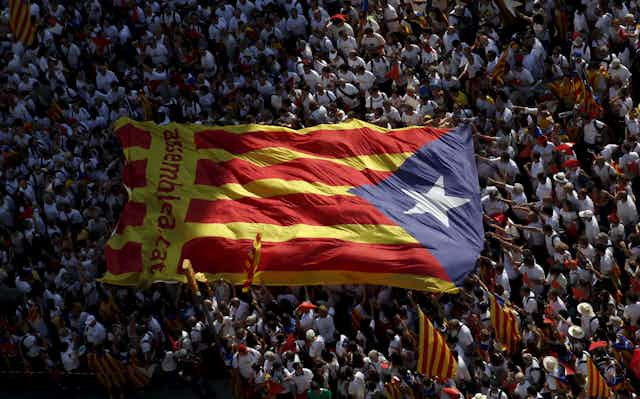Catalans go to the polls on September 27 to elect their regional parliament, which will, in turn, determine who will be president of the region.
After repeated attempts to hold a binding Catalonian referendum rebuffed by the Spanish government, pro-independence forces have decided to hold a regional election and frame it as a plebiscite.
All rich democracies in the world are currently afflicted by a crisis of representation. Europe’s economic crisis has not only raised questions about how states are governed, it has also intensified the desire to change the very nature of those states, including their frontiers.
The 2008 economic crisis intensified Madrid’s subordination of Catalonia, as Spain, like many other states, tried to weather the storm by recentralising power. The Spanish state has tried to claw back powers in a range of areas, including education, which has been governed regionally since the early 1980s.
Profound questions about the post-Franco constitutional settlement of 1978 have been circulating throughout the country, and change is in the air. A king chosen by Franco has departed to be replaced by his son Felipe, and Spain’s traditional two-party system has ruptured.
In the European elections of 2014, the left wing movement Podemos emerged and embodied hopes for change. But over the course of 2015, support for the insurgent party has collapsed from 27% in January to barely 10% by September. The prospect of meaningfully reforming the Spanish state has receded.
This trend has determined the latest phase in the Catalonia independence debate and its challenge to the unity of Spain.
Catalan independence has become dominant as a political narrative because it brings together the old leftist movement for independence with angry, frustrated Catalans who have been mobilised by grievances over national and cultural identity, economic discontent and a broader sense of social malaise.
For most of the period from 2010 to 2014, the movement for independence was highly effective at setting the political agenda. But since November 2014, when Catalonia held a symbolic vote on independence, political support for the movement has fragmented.
At the time, an overwhelming 80% wanted the right to vote on their political future. The right to vote on Catalonia’s future is not coterminous with support for independence. Most Catalans want to be able to make the decision themselves, whether they are explicitly committed to independence or not.
For the first time, Catalan society has a clearly polarised position on independence, closer to what was seen in Scotland in September 2014. The “no” campaign has failed to convince, though, usually relying on the position that independence is illegal. There has been no real attempt to persuade Catalans to stay on the basis of mutual respect.
Taking on Madrid
To outside observers, Catalan politics is only getting more labyrinthine. No fewer than nine political parties are likely to win representation in the Catalan regional parliament in this forthcoming election.

The pro-independence platform Junts pel Sí (Together for Yes) is certain to win the election overall, but the scale of its victory will be fundamental in determining the severity of the collision with Madrid that will inevitably occur within the next weeks or months.
Pivotal here will be whether it obtains a majority in parliament (68 seats) or whether it will need the support of a radical left nationalist grouping. And, if it wants international sympathy for its cause, the pro-independence movement will need to secure 50% of the votes to show that it has majority popular support.
The British general election result should remind us to be cautious about polls, but the general trend so far suggests that it is unlikely the key 50% figure will be obtained. Falling below 50% will not mean the movement is over but it would be a setback.
What’s more the Catalan independence movement, in particular the government of Artur Mas, is trapped by its deep psychological commitment to law and order. This culminated in the decision to submit to demands from Madrid in October 2014 to cancel the planned consultation on independence on November 9. It instead held a symbolic but unofficial referendum.
On every single occasion since, with an increasingly interventionist Spanish judicial system acting under political instruction, the Catalan government has submitted to Spanish law. This has included declarations of sovereignty by the Catalan parliament and in attempts to create a Catalan tax authority.
As the situation has deteriorated, the distance between Madrid and Catalonia has grown and in the absence of any offer of greater powers from Madrid, Mas has fully embraced the independence cause.
Staying together?
Catalan independence remains unlikely in the immediate future, but the Catalan parliament could make a political challenge to the state order in Spain, just as it heads into a national election in December. Pivotal here will be the actions of the new Catalan government and whether it attempts to establish real state structures in Catalonia.
A low-intensity conflict is certain. Spain will never voluntarily accept the independence of Catalonia, and if it came to that, it would engender the greatest crisis of the Spanish political system since the death of the dictator Franco in 1975.
Spain’s conception of its national identity is deeply and profoundly territorial. As far as Spain is concerned, Catalonia will remain Spanish forever. Given the extreme rigidity of that position, if Madrid seeks to make life harder for Catalonia, it may attract international attention and perhaps intervention. But that could result in a settlement for Catalonia that falls short of independence.
A real and ever-growing question for Europe will be how the Spanish government proposes to continue to govern this territory – up to half of whose people seem firmly committed to removing themselves from Spain.

